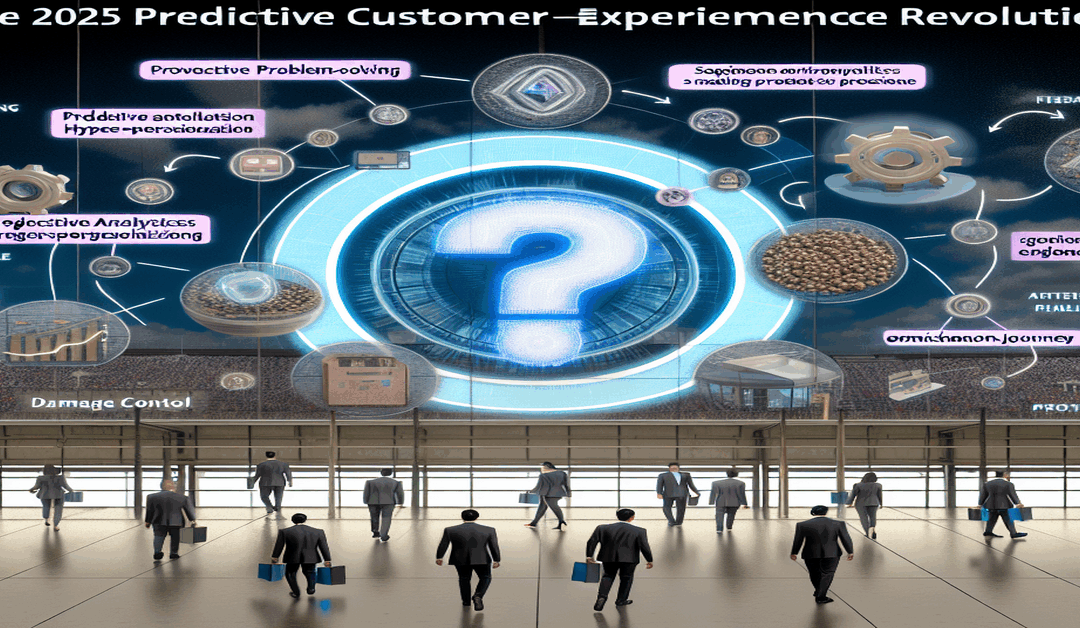The Predictive CX Revolution: How AI is Transforming Customer Experience in 2025
As we approach the midpoint of the 2020s, the customer experience (CX) landscape is undergoing a profound transformation. Driven by the rapid advancement of artificial intelligence (AI) and the increasing availability of data, businesses are shifting from reactive to predictive models, revolutionizing the way they interact with customers. In this blog post, we’ll explore the key elements of the 2025 predictive CX revolution and how it’s shaping various industries.
Proactive Problem-Solving: Anticipating Needs Before Issues Arise
One of the most significant changes in the CX realm is the move from reactive to proactive problem-solving. By leveraging AI and machine learning algorithms, businesses can now **anticipate customer needs and address potential issues before they even arise**. For example, Bank of America’s virtual assistant, Erica, proactively alerts users to unusual spending patterns, helping them avoid potential financial pitfalls [1][2].
This proactive approach not only enhances the customer experience but also reduces the burden on customer support teams. Instead of constantly putting out fires, businesses can focus on delivering value and building stronger relationships with their customers.
Hyper-Personalization: The “Segment-of-One” Approach
Gone are the days of generic segmentation and one-size-fits-all marketing. In the era of predictive CX, businesses are embracing a **”segment-of-one” approach**, tailoring experiences to each individual customer [4][5]. By leveraging zero-party data (information voluntarily shared by customers) and AI-driven insights, brands can deliver highly personalized interactions that resonate with customers on a deeper level.
This hyper-personalization extends beyond simple product recommendations. It encompasses every aspect of the customer journey, from targeted content and offers to customized support and service. By making each customer feel valued and understood, businesses can foster loyalty and drive long-term growth.
AI-Driven Efficiency: Automating Routine Tasks and Optimizing Processes
AI is not only transforming the customer-facing aspects of CX but also revolutionizing back-end processes. **Generative AI**, for instance, is automating routine tasks, allowing human agents to focus on more complex and nuanced interactions [4]. This not only improves efficiency but also enables businesses to provide a more personalized and empathetic customer experience.
Moreover, **predictive analytics** is optimizing various processes, from inventory management to healthcare diagnostics. Mayo Clinic, for example, is using AI to detect diseases early, enabling timely intervention and improved patient outcomes [1][5]. By streamlining operations and making data-driven decisions, businesses can deliver a more seamless and efficient CX.
Seamless Omnichannel Journeys: Value-Driven Personalization Across Touchpoints
In the predictive CX era, businesses are focusing on creating **seamless omnichannel journeys** that prioritize value-driven personalization across all touchpoints [4][5]. By leveraging behavioral data and AI insights, brands can reduce friction and deliver consistent, tailored experiences, whether customers are interacting via web, mobile, or in-store.
This holistic approach to CX not only enhances customer satisfaction but also builds trust and loyalty. When customers feel that a brand truly understands their needs and preferences, they are more likely to become long-term advocates and repeat purchasers.
Industry Applications: From Finance to Healthcare
The predictive CX revolution is impacting a wide range of industries, each with its own unique applications and benefits. In the finance sector, for example, AI-powered systems are enabling real-time fraud alerts and personalized financial guidance, empowering customers to make more informed decisions [2].
In retail, brands like Nike are using AI to provide preemptive styling suggestions, anticipating customer preferences and delivering hyper-personalized recommendations [1]. This not only enhances the shopping experience but also drives incremental sales and customer loyalty.
Healthcare is another industry that stands to benefit greatly from predictive CX. By leveraging AI for early disease detection and personalized treatment plans, healthcare providers can improve patient outcomes and reduce the burden on the healthcare system [1][5].
The Bottom Line: Transforming CX from Cost Center to Competitive Differentiator
As businesses adopt predictive CX strategies, they are transforming customer experience from a cost center into a **powerful competitive differentiator**. By prioritizing preemptive engagement and personalization, brands can build stronger, more resilient relationships with their customers, driving long-term growth and success [1][3][5].
The predictive CX revolution is not a distant future; it’s happening right now. Businesses that embrace AI and data-driven insights will be well-positioned to thrive in the evolving CX landscape, while those that cling to outdated, reactive models risk falling behind.
As we move towards 2025 and beyond, the question is not whether to adopt predictive CX strategies, but how quickly and effectively businesses can integrate them into their operations. The future of customer experience is predictive, personalized, and powered by AI – and it’s already here.
#PredictiveCX #AICustomerExperience #HyperPersonalization
-> Original article and inspiration provided by Daniel Burrus
-> Connect with one of our AI Strategists today at ReviewAgent.ai

